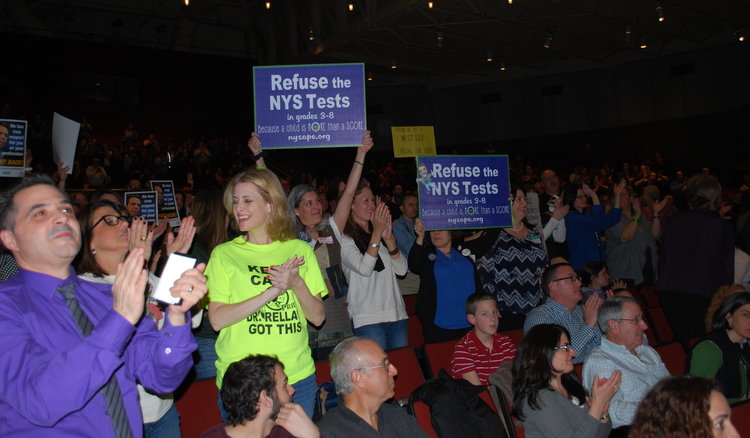Diane Ravitch, renowned education historian, policy analyst, research professor, author and blogger, is fond of asking: “What if they threw a test and nobody took it?”
New York is about to find out.
Record-breaking numbers of students throughout Long Island and New York State refused to take the Common Core ELA (English Language Arts) exam two weeks ago, and unprecedented scores opted out of the math portion of the standardized tests last week. An integral part of the Common Core education reform initiated by the Obama administration and championed by Gov. Andrew Cuomo, the mass rejection of the controversial exams provoked responses from state and federal school officials about potential ramifications that’ve only further incited opponents’ fury.
At press time, unofficial tallies of opt-out numbers from last week’s math exams for approximately one-quarter of LI’s 124 school districts compiled by Jeanette Deutermann—founder of anti-Common Core Facebook group “Long Island Opt Out” and a founding member of New York State Allies for Public Education (NYSAPE), a coalition of 50 parent and teacher organizations who oppose the standardized tests—counts more than 36,000 students who’ve refused. More than 82,000 students rejected the latest round of ELA exams, according to her figures, and last year, approximately 22,000 refused the math tests. Because honor-level eighth graders will be taking the New York State (NYS) Regents exam as well as the Common Core Regents exam this year, they are exempt from this round of testing, skewing the refusal numbers, explains Deutermann, though these preliminary math figures still show even higher percentages of refusals than those rejecting the ELA exams.
“You’ll see the total numbers go down, but the overall percentages go up,” Deutermann tells the Press.
For example, Comsewogue School District went up to 84 percent [from 82 percent for the ELA test last week], according to her tally, which she collects from school officials. Connectquot went up to 74 percent from 69 percent. Hewlett-Woodmere had 608 refusals and 46 percent for ELA; they went down to 579, but their percentage went up to 50 percent, says Deutermann.
An East Islip school official tells the Press their district’s math refusals went up from 61 to 65 percent.
Though hopeful the staggering numbers of refusals on both recent exams—administered to students in grades three to eight throughout three days—will help instigate a complete dropping of the testing here in New York, Common Core opponents say it’s at least shifted the national dialogue in their favor.
“Parents’ conversations at the ball fields have changed from ‘Why opt-out?’ to ‘Why high-stakes testing?’” says Anthony Griffin, a Central Islip High School teacher and the co-founder of student advocacy group Lace to the Top. “I hope this will change soon to excitement about new assessments that are fair, transparent, and useful to students, families and teachers.”
Fueling the mass rejections are a litany of complaints among parents and teachers, two being that their objections are falling on deaf ears and that Common Core supporters continue to mischaracterize them as frightened of academic challenges and what state Board of Regents Chancellor Merryl Tisch dubs as students being caught in the crosshairs of a “labor dispute” between teachers unions and the governor.
“This is a governor who is just fixated on firing teachers and breaking the union,” slams Carol Burris, principal of South Side High School and 2013 New York Principal of the Year, in a phone interview from the Network for Public Education conference in Chicago April 25. “There’s no other lens to see it because it’s not in the best interest of the children.”
Other gripes harbored by parents opposing the Common Core tests include their belief that the exams lack diagnostic value, as test scores are returned during the summer and cannot be used to further instruction. Zephyr Teachout, Fordham professor and former Democratic gubernatorial primary challenger to Cuomo, tells the Press: “The tests have no pedagogical value, so parents are opting out because they aren’t helping the kids.”
Opponents are concerned that with such a heavy focus on high-stakes testing, teaching in the classroom would resort to an increasing amount of test preparation at the expense of various other learning opportunities and a more diverse curriculum. They contend the assessments are age- and grade-level inappropriate, charging as proof that several reading samples for the recent ELA tests were coded two to three grade levels above appropriate reading levels.
The large number of students rejecting the exams has sparked speculation among critics that the federal government will get involved—and possibly punish those that do not embrace the standards. Nonprofit educational change news organization ny.chalkbeat.org reported that when asked whether districts with substantial boycotting would face consequences, US Secretary of Education Arne Duncan replied he expected states to make sure districts get enough students to take the tests.
“We think most states will do that,” said Duncan, speaking at the Education Writers Association conference in Chicago last week. “If states don’t do that, then we have an obligation to step in.”
Anti-Common Core stalwarts such as Deutermann take his and similar, more blatantly explicit statements by education officials as threats to withhold federal funding from states with low participation rates or levy sanctions.
“They throw around these attacks and threats like it’s just nothing,” Deutermann slams in a recent phone interview. “Like, ‘If the state doesn’t come after them, we will.’
“What point have we gotten to when the Secretary of Education starts saying that if a state doesn’t punish parents for looking out for the best interest of their kids, we will step in and punish them?” she continues. “This is what they don’t get: You can’t punish a teacher, a district, a school—without punishing a child. You can’t do one without the other. It doesn’t work that way. You want to strip Title 1 money away from kids who are economically disadvantaged? Guess who gets hurt? Not the school. Not the administrators. The kids who are economically disadvantaged.”
Burris, the South Side High School principal who announced her resignation after the New York State legislature approved Cuomo’s budget allotting 50 percent of teacher evaluations to be based upon these tests, agrees that financial penalties will do little to stem the tide of this growing resistance.
“If they think people will all of a sudden feel intimidated and say this is okay, it won’t happen,” she blasts. “The number of] principals who think this is a bad course to follow is only going to grow, not shrink.”
Yet Tisch, the state Regents chancellor, says she doesn’t want the children to suffer, either.
“Over the past few weeks, I’ve heard from administrators, teachers and school boards across the state,” she said in an April 22 announcement that teacher evaluation deadlines may be extended to September 2016. “They’re concerned about the very tight timeframe, and they’re right. And I’m worried about the fiscal implications for districts that can’t meet that deadline. Students should not be denied resources because of adult disagreements.”
Deutermann doesn’t buy the chancellor’s newfound sense of compassion, and along with the rest of NYSAPE, she’s calling for Tisch’s resignation and a slew of other demands. Among these: a dramatic reduction of testing in grades three to eight; an independent review of the NYS career- and college-ready standards; the establishment of a taskforce including parents, educators and stakeholders to study Common Core Learning Standards and make recommendations to adjust and adopt NYS standards; adherence to a public and transparent process for selecting a new state commissioner of education; legislation that decouples student test scores and restores local board of education control over teacher evaluations; and legislation requiring parental consent to share any identifiable student data beyond school district administrators.
Deutermann says the historic and ever-growing number of op-out refusals is just the beginning of what she and so many other parents and teachers hope is a total, statewide retraction of Common Core, something she’s predicted and will continue fighting toward.
“When I told people back a couple of months ago when they asked, ‘What’s going to happen if we get a tremendous amount of people refusing the test?’ I told them, ‘You’re going to see a systematic breakdown. This thing’s going to crumble. You’ll see the bricks falling off the walls. One after another.’
“And this is it.”



































